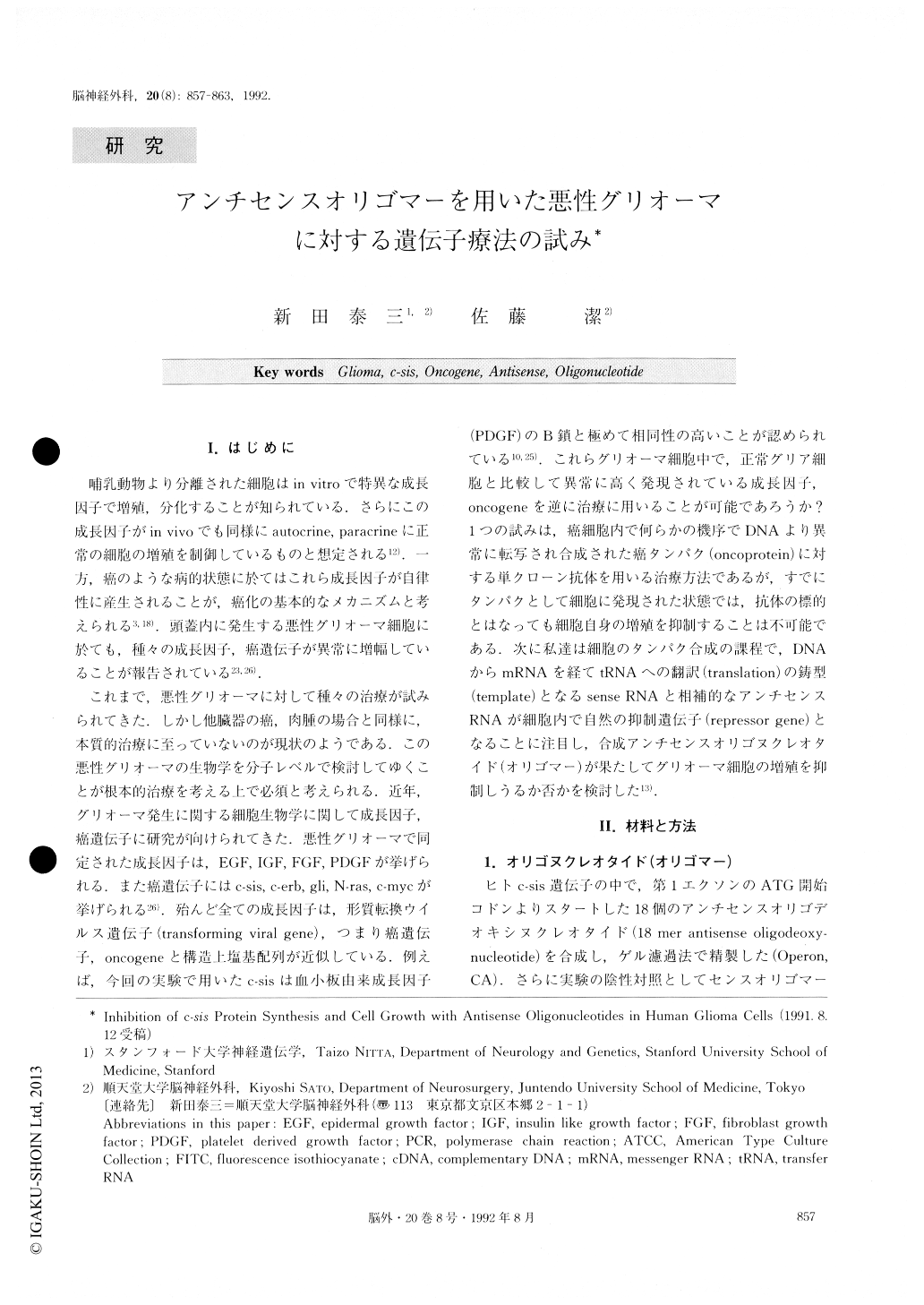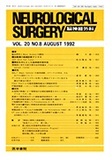Japanese
English
- 有料閲覧
- Abstract 文献概要
- 1ページ目 Look Inside
I.はじめに
哺乳動物より分離された細胞はin vitroで特異な成長因子で増殖,分化することが知られている.さらにこの成長因子がin vivoでも同様にautocrine, paracrineに正常の細胞の増殖を制御しているものと想定される12).一方,癌のような病的状態に於てはこれら成長因子が自律性に産生されることが,癌化の基本的なメカニズムと考えられる3,18).頭蓋内に発生する悪性グリオーマ細胞に於ても,種々の成長因子,癌遺伝子が異常に増幅していることが報告されている23,26).
これまで,悪性グリオーマに対して種々の治療が試みられてきた.しかし他臓器の癌,肉腫の場合と同様に,本質的治療に至っていないのが現状のようである.この悪性グリオーマの生物学を分子レベルで検討してゆくことが根本的治療を考える上で必須と考えられる.近年,グリオーマ発生に関する細胞生物学に関して成長因子,癌遺伝子に研究が向けられてきた.悪性グリオーマで同定された成長因子は,EGF, IGF, FGF, PDGFが挙げられる.また癌遺伝子にはc-sis, c-erb, gli, N-ras, c-mycが挙げられる26).殆んど全ての成長因子は,形質転換ウイルス遺伝子(transforming viral gene),つまり癌遺伝子,oncogeneと構造上塩基配列が近似している.例えば,今回の実験で用いたc-sisは血小板由来成長因子(PDGF)のB鎖と極めて相同性の高いことが認められている10,25),これらグリオーマ細胞中で,正常グリア細胞と比較して異常に高く発現されている成長因子,oncogeneを逆に治療に用いることが可能であろうか?1つの試みは,癌細胞内で何らかの機序でDNAより異常に転写され合成された癌タンパク(oncoprotein)に対する単クローン抗体を用いる治療方法であるが,すでにタンパクとして細胞に発現された状態では,抗体の標的とはなっても細胞白身の増殖を抑制することは不可能である.次に私達は細胞のタンパク合成の課程で,DNAからmRNAを経てtRNAへの翻訳(translation)の鋳型(template)となるsense RNAと相補的なアンチセンスRNAが細胞内で自然の抑制遺伝子(repressor gene)となることに注目し,合成アンチセンスオリゴヌクレオタイド(オリゴマー)が果たしてグリオーマ細胞の増殖を抑制しうるか否かを検討した13).
The protein encoded by the proto-oncogene c-sis is over-amplified in human neuroglial tumors and has been hypothesized as playing an important role intumorigenesis, but this hypothesis remains to be clar-ified. In order to address this issue, we examined the effect of 18-bp oligodeoxynucleotides complementary to the sense mRNA of c-sis upon glioma cell growth. First, we investigated the expression of c-sis proto-oncogenes within cultured human glioma cell lines and also fresh glioma specimens by using polymerase chain reaction. We could detect mRNA transcripts of c-sis in 3 Out of 4 glioma cell lines (U138MG, U251MG and A172) and two in 5 glioblastoma multiforme specimens. The antisense oligonucleotides complementary to c-sis mRNA were efficiently incorporated into A172 in vitro and the kinetic study showed that maximum uptake occurred after 48 hours of incubation with antisense oli-gomers. Exposure of human glioma cell lines to anti-sense oligodeoxynucleotides targeted against first initia-tion codon inhibited cell proliferation in a time and close dependent fashion. From the flow cytometric analysis using anti-c-sis sera, it was demonstrated that the antisense oligomers specifically block the de novo synthesis of intracellular c-sis protein by glioma cells dose-dependently. In contrast to this, the corresponding sense oligomers inhibited neither synthesis of c-sis pro-tein nor glioma cell growth. Taken together, these re-sults clearly support a role of c-sis protein in the prolif-eration process and show that inducible protein ex-pression can be blocked by means of synthetic oligo-nucleotides complementary to a coding exon.

Copyright © 1992, Igaku-Shoin Ltd. All rights reserved.


